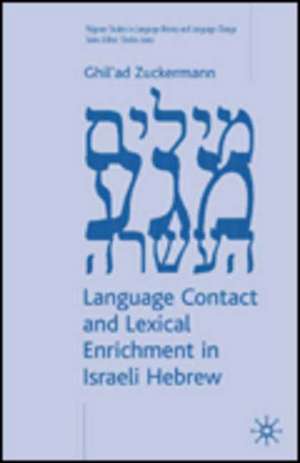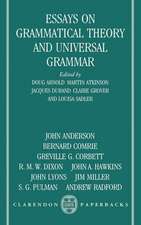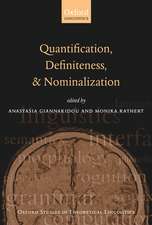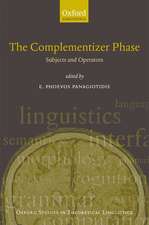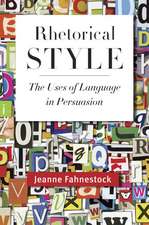Language Contact and Lexical Enrichment in Israeli Hebrew: Palgrave Studies in Language History and Language Change
Autor G. Zuckermannen Limba Engleză Hardback – 4 noi 2003
| Toate formatele și edițiile | Preț | Express |
|---|---|---|
| Paperback (1) | 638.24 lei 43-57 zile | |
| Palgrave Macmillan UK – 4 noi 2003 | 638.24 lei 43-57 zile | |
| Hardback (1) | 642.36 lei 43-57 zile | |
| Palgrave Macmillan UK – 4 noi 2003 | 642.36 lei 43-57 zile |
Preț: 642.36 lei
Preț vechi: 755.72 lei
-15% Nou
Puncte Express: 964
Preț estimativ în valută:
122.95€ • 133.60$ • 103.35£
122.95€ • 133.60$ • 103.35£
Carte tipărită la comandă
Livrare economică 21 aprilie-05 mai
Preluare comenzi: 021 569.72.76
Specificații
ISBN-13: 9781403917232
ISBN-10: 140391723X
Pagini: 306
Ilustrații: X, 294 p. 1 illus.
Dimensiuni: 140 x 216 x 22 mm
Greutate: 0.47 kg
Ediția:2003
Editura: Palgrave Macmillan UK
Colecția Palgrave Macmillan
Seria Palgrave Studies in Language History and Language Change
Locul publicării:London, United Kingdom
ISBN-10: 140391723X
Pagini: 306
Ilustrații: X, 294 p. 1 illus.
Dimensiuni: 140 x 216 x 22 mm
Greutate: 0.47 kg
Ediția:2003
Editura: Palgrave Macmillan UK
Colecția Palgrave Macmillan
Seria Palgrave Studies in Language History and Language Change
Locul publicării:London, United Kingdom
Cuprins
Acknowledgements Abbreviations Introduction New Perspectives on Lexical Enrichment The Case of Israeli: Multisourced Neologization (MSN) as an Ideal Technique for Lexical Enrichment Addition of Sememe Versus Introduction of Lexeme MSN in Various Terminological Areas Sociolinguistic Analysis: Attitudes Towards MSN in 'Reinvented Languages' The Source Languages Statistical Analysis Conclusions and Theoretical Implications Appendix: Transcription, Transliteration and Translation References Index
Recenzii
'...this is the first time that anyone has drawn attention to the extent to which 'phono-semantic matching' applies in word formation...a most important contribution to the study of Israeli Hebrew word formation in particular and of language change in general.' - Shmuel Bolozky, Professor of Hebrew, University of Massachusetts
'This book will interest not only researchers and graduate students in the topic but also Hebraists. Moreover, any layman who loves words will find it absorbing and entertaining... it is both scholarly and original [and] an outstanding contribution to the science of etymology.' - Professor Geoffrey Lewis, St Antony's College, Oxford
'..fascinating and multifaceted... a paean to linguistic creativity. It is especially timely in the present historical context of rapid globalization and linguistic inter-influence.' - Professor James A. Matisoff, Department of Linguistics, University of California, Berkeley
'The volume is extremely impressive. Zuckermann demonstrates a mastery of European and Hebrew lexicography... In addition to developing a rigorous analytical framework, he offers many detailed word (and compound) histories and carves out a well-defined position on issues of much significance.' - Professor Jeffrey Heath, University of Michigan
'The book is an outstanding piece of scholarship which undoubtedly represents a milestone in the field of lexicology. Zuckermann's attention to details has made the work amini-encyclopaedia, much in the tradition of Jewish scholarship. Generally, his etymologies are well thought out and set a standard for current and future research.' - Joseph T. Farquharson, Linguistlist
'This book will interest not only researchers and graduate students in the topic but also Hebraists. Moreover, any layman who loves words will find it absorbing and entertaining... it is both scholarly and original [and] an outstanding contribution to the science of etymology.' - Professor Geoffrey Lewis, St Antony's College, Oxford
'..fascinating and multifaceted... a paean to linguistic creativity. It is especially timely in the present historical context of rapid globalization and linguistic inter-influence.' - Professor James A. Matisoff, Department of Linguistics, University of California, Berkeley
'The volume is extremely impressive. Zuckermann demonstrates a mastery of European and Hebrew lexicography... In addition to developing a rigorous analytical framework, he offers many detailed word (and compound) histories and carves out a well-defined position on issues of much significance.' - Professor Jeffrey Heath, University of Michigan
'The book is an outstanding piece of scholarship which undoubtedly represents a milestone in the field of lexicology. Zuckermann's attention to details has made the work amini-encyclopaedia, much in the tradition of Jewish scholarship. Generally, his etymologies are well thought out and set a standard for current and future research.' - Joseph T. Farquharson, Linguistlist
Notă biografică
GHIL'AD ZUCKERMANN is Gulbenkian Research Fellow at Churchill College, Cambridge. He teaches and supervises at the Faculty of Oriental Studies and is affiliated with the Department of Linguistics. He has published in English, Israeli, Italian, Yiddish, Spanish and Russian, has taught in Singapore, the USA and Israel and conducted research in Japan and Australia.
